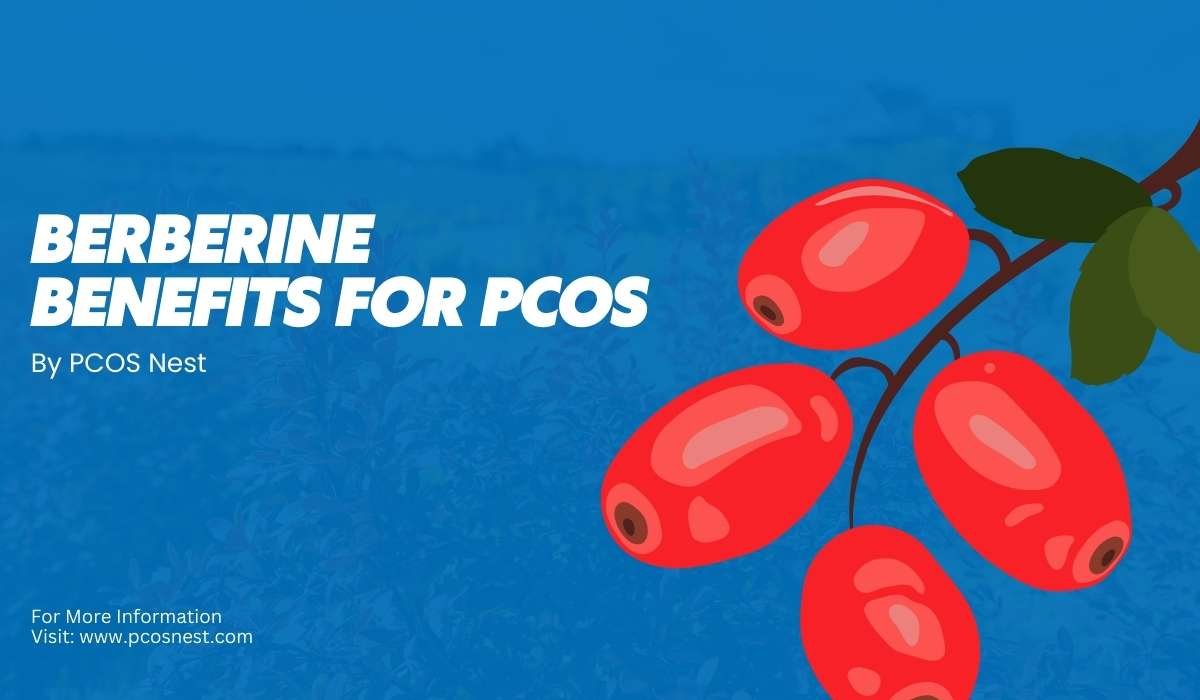Berberine is a natural substance found in plants like Berberis vulgaris (also called barberry). It’s been used for centuries in traditional Chinese and Ayurvedic medicine. Recently, studies have shown that it may help women with PCOS especially those with insulin resistance and irregular periods.
What is Berberine?
Berberine is well-known for its anti-inflammatory, anti-bacterial, and blood sugar-lowering effects. Research suggests it can be helpful for managing several symptoms of PCOS, including hormonal imbalance and insulin resistance.
Berberine Benefits?
Many women with PCOS have insulin resistance, where the body doesn’t respond well to insulin. This leads to high insulin levels, which can cause weight gain, irregular periods, acne, and fertility issues.
1. Improves Insulin Sensitivity:
Berberine helps the body respond better to insulin and lowers blood sugar, just like the medicine metformin.
2. Balances Hormones:
High insulin can increase testosterone in women with PCOS. Berberine helps reduce these levels, which may improve acne, unwanted hair growth, and help bring back regular periods.
3. Supports Weight Loss:
It may help improve metabolism and reduce belly fat, which is common in PCOS.
4. Reduces Inflammation:
PCOS is linked with low-grade inflammation. Berberine has anti-inflammatory effects that may improve overall health.

Berberine vs. Metformin: Which One is Better for PCOS?
Both berberine and metformin are commonly used to manage PCOS symptoms especially insulin resistance. While metformin is a prescription medicine, berberine is a natural compound found in herbs like barberry. Let’s compare:
1. How They Work:
Metformin:
- It lowers the amount of sugar your liver makes.
- Helps the body use insulin better (improves insulin sensitivity).
- Reduces blood sugar levels.
Berberine:
- Works on a cellular level to activate AMPK (an enzyme that controls energy use).
- Improves how the body uses insulin.
- Reduces blood sugar and fat in the blood.
In short: Both improve insulin resistance, but they work in slightly different ways. Berberine acts more broadly on metabolism.
2. Effects on Insulin Resistance and Blood Sugar:
Metformin:
- Proven effective in reducing insulin levels and blood sugar.
- Often prescribed as a first-line treatment for women with PCOS and type 2 diabetes.
Also Read: Foods to Avoid When Taking Metformin for PCOS
Berberine:
- Studies show it is just as effective as metformin in lowering blood sugar and insulin.
- One study found that berberine worked as well as metformin in women with PCOS for improving insulin sensitivity and glucose metabolism.
3. Weight Loss:
Metformin:
- Helps with slight weight reduction in some women with PCOS.
- However, the effect is often modest.
Berberine:
- May be more effective than metformin for weight loss.
- Improves fat-burning and metabolism, especially around the belly area (common in PCOS).
4. Hormone Balance:
Both help lower high insulin, which reduces androgen (male hormone) levels. This can:
- Improve acne
- Reduce facial hair
- Restore regular periods
Some research shows berberine might be more effective in lowering testosterone than metformin.
5. Ovulation and Fertility
- Both may help bring back ovulation and improve chances of pregnancy.
- In one study, berberine improved ovulation rates and endometrial thickness better than metformin in women with PCOS preparing for IVF.
6. Side Effects:
Metformin:
Common side effects:
- Nausea
- Diarrhea
- Bloating
- Stomach cramps
These can be hard to tolerate for some women.

Berberine:
Usually well tolerated. Some people may get:
- Mild stomach upset
- Constipation
- Bitter taste
Note: Berberine may interact with other medications (especially for blood sugar and blood pressure), so always consult your doctor. It’s not recommended during pregnancy or breastfeeding.
| Feature | Metformin | Berberine |
| Type | Prescription drug | Natural supplement |
| Improves insulin? | Yes | Yes (same level as metformin) |
| Lowers testosterone? | Yes | Possibly more effective |
| Supports ovulation? | Yes | Yes, may be better |
| Helps with weight? | Slight | More effective |
| Side effects? | Often cause GI upset | Usually mild or none |
Berberine Dosage and How to Take It:
- Typical dose: 500 mg, 2 or 3 times daily, before meals.
- Needs to be taken regularly for at least 3 months to notice results.
- Choose a high-quality supplement from a trusted brand.
Always talk to a doctor first, especially if you’re already taking medications for blood sugar or blood pressure.
Who Should Consider It?
Berberine may be helpful for women who:
- Have insulin resistance
- Struggle with weight gain or irregular periods
- Want a natural approach to managing PCOS
It works best when used with:
- A healthy, balanced diet
- Regular exercise
- Consistent sleep and stress management
Also Read: How to Lose Weight with PCOS through Diet?
Frequently Asked Questions:
How much Berberine for weight loss?
The typical recommended dose is 500 mg, 2 to 3 times daily (total 1,000–1,500 mg per day), taken before meals.
Can berberine cause hair loss?
Berberine does not cause hair loss in most people. In fact, it may help reduce hair loss in women with PCOS by lowering insulin and testosterone levels
Does berberine reduce belly fat?
Yes, berberine can help reduce belly fat, especially in people with insulin resistance. Studies show it improves metabolism, reduces fat storage, and activates the AMPK enzyme (often called a “metabolic master switch”), which helps burn fat more effectively.
Is berberine a metformin?
No, berberine is not metformin. Berberine is a natural plant compound, while metformin is a prescription medication. They are different substances but work in similar ways, both improve insulin sensitivity and lower blood sugar. Studies show that berberine can be as effective as metformin in managing insulin resistance, especially in women with PCOS.
📚 References (Verified Sources):
- Zhang Y. et al. (2011). Berberine in the treatment of type 2 diabetes mellitus: A meta-analysis. Evidence-Based Complementary and Alternative Medicine.
- Wei W. et al. (2012). Berberine improves insulin resistance in women with PCOS. Clinical Endocrinology.
- An Y. et al. (2014). Berberine improves ovulation and endometrial receptivity in anovulatory women with PCOS. Clinical Endocrinology.
- Zhang H. et al. (2009). Berberine reduces insulin resistance through PKC-dependent mechanisms. Metabolism.
- Kong W. et al. (2004). Berberine is a novel cholesterol-lowering drug. Nature Medicine.
- U.S. National Center for Complementary and Integrative Health (NCCIH). Berberine: What You Need to Know.

